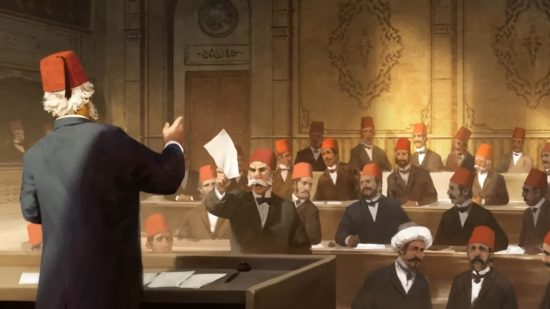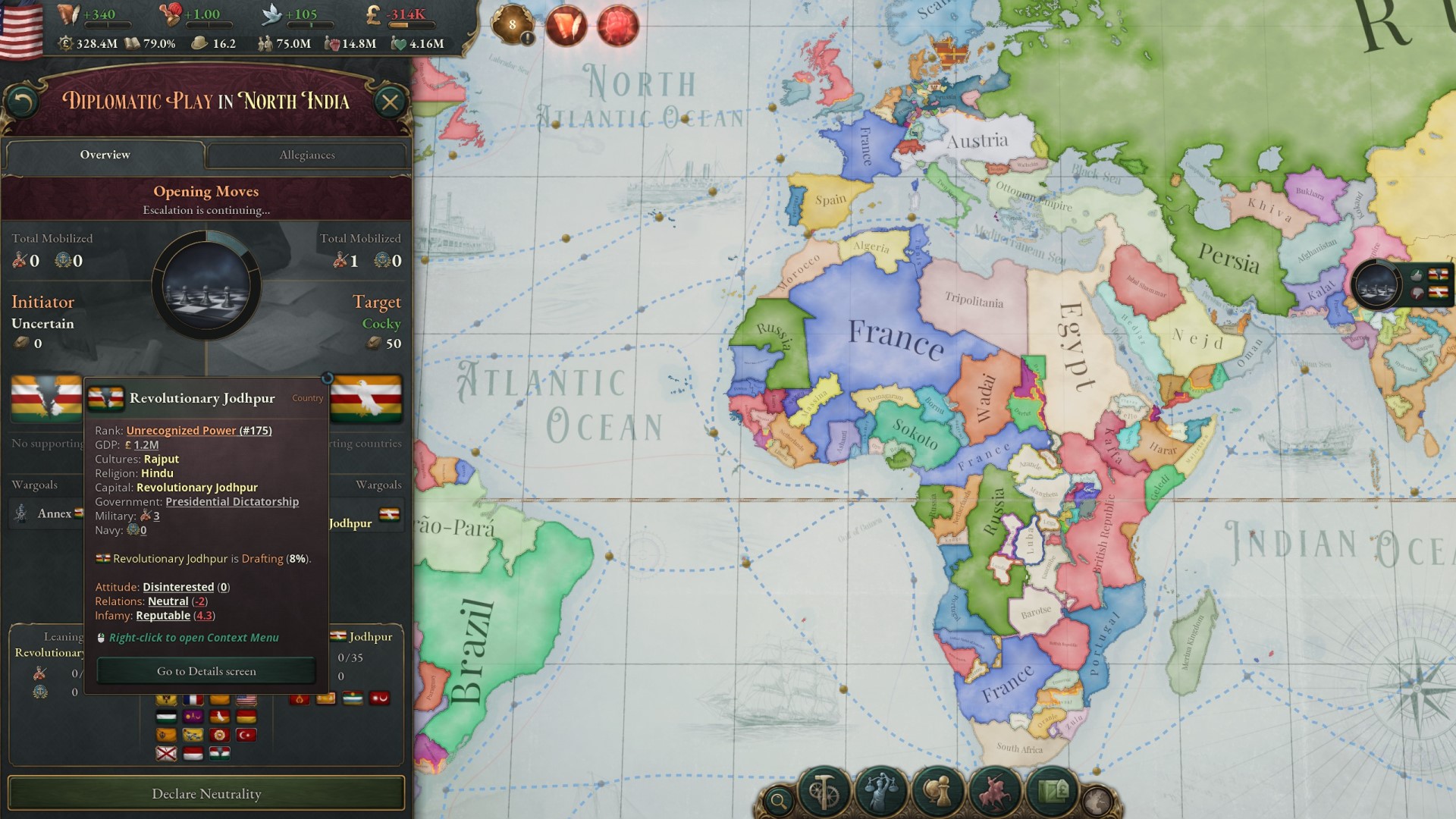Victoria 3 diplomatic plays are the openings for most important international actions – they’re hostile demands that can often result in war. It’s a new concept for Paradox grand strategy games, but don’t worry: the diplomatic play system is easy to use, and in most cases, these situations will handle themselves.
During diplomatic plays, one nation is making a formal demand of another, and any nations interested in the region where this is taking place have the opportunity to weigh in and sway the outcome. Knowing what’s happening and when you can take action is key to using and responding to diplomatic plays effectively.
How do diplomatic plays work?
Every diplomatic play in Victoria 3 is essentially a timer that passes through three phases: opening moves, diplomatic manoeuvring, and finally, countdown to war.
Diplomatic plays can be initiated for a variety of reasons. The most straightforward reason, and the one Crusader Kings players will no doubt gravitate toward, is to conquer a piece of territory controlled by another country. However, they can also begin if one country makes a demand of another, such as abolishing slavery or opening their market for trade.
The opening moves phase of a play can be thought of as an ‘announcement’ to the world that something’s about to happen between two countries. It’s a period of time in which everyone with an interest in the area can marshall forces or plan out their response to the incident.
The key phase is the diplomatic manoeuvring stage. Whether you’re one of the two main parties in the play or simply an interested nation, this is where the important action will take place. Both the target of the play and its initiator can at this point attempt to use their stack of ‘moves’ chits to sway other nations to their side of the conflict.
Nations involved in the play will sometimes use this phase to mobilise generals and their battalions, and even send them to any fronts that have formed between the two belligerents. The two main parties can also add to or adjust their demands. Nations supporting one side or another, troop mobilisation, and the list of demands on each side all figure into the balance of the play – and up through this second phase, either side can back down or capitulate.
Once the diplomatic manoeuvring phase is over, the diplomatic play shifts to the countdown to war – at this point, everyone is locked in. The only things that can stop war from breaking out at this point is the initiator backing down or the target capitulating – and in either case, acceding to their all enemy’s demands. War goals cannot be adjusted at this point, however.
How to use Diplomatic Plays in Victoria 3
Any time a diplomatic play is active in one of your areas of interest (or involving you), you’ll see it on the right side of the screen, near the top. It’s displayed as a larger, round icon with spaces for both principal actors on its sides. Click it to open the menu for the diplomatic play.
If you’re one of the two main countries involved in the dispute, the overview tab will give you a breakdown of the military forces currently mobilised on either side of the conflict, the war goals of both sides, and the nations that have natural or declared interests in the area – these can potentially be swayed using manoeuvre chits, and a the number of these each player has is displayed over their respective flags.
To use these chits, click the Sway Nations tab at the top of the menu. This will display all the nations you can attempt to convince to support your side in the conflict. Sometimes you can convince a nation that’s on the fence to back you in exchange for an obligation – which you should be careful about handing out, since they can get you dragged into someone else’s fight without getting the chance to turn them down. There can be other ways available to sway nations to your side: you might, for example, offer to force your enemy to pay war reparations, or give your potential ally a slice of territory if you win. Consider these options carefully before sending your offer, but remember: the clock is ticking.
Mobilising your generals and sending them to the fronts will escalate the diplomatic play – in other words, it will move the countdown timer closer to the countdown to war phase. However, this is also a game of chicken – a show of force can in many cases convince a belligerent to back down before a single shot has been fired. Remember, everything you can accomplish through war can also be achieved through diplomacy – it’s just a matter of getting the other side to capitulate.
Frequently, you’ll be called into diplomatic plays as a secondary target, as an overlord of one of the nations directly involved, or merely as someone with an interest in the region. In this case, during the diplomatic manoeuvring phase, you’ll have the option of pledging your support to one side, or declaring neutrality. You’ll find options for this on the second tab when you open the menu for the ongoing diplomatic play. Click on the arrows pointing to the side you want to support to weigh in.
Diplomatic effects
Diplomatic plays will often result in war, in which case, the icon and menus will change over to a warfighting menu – this includes a tab for handling peace negotiations.
However, it’s important to remember before launching a diplomatic play that most aggressive actions result in some gain of infamy. The higher this number gets, the more infamous you are, and that will have a major impact on the way other nations deal with you. High infamy can prevent trade deals and will make other countries reluctant to form other kinds of alliances with you too. So, make sure your goals are worth taking that reputational hit before embarking.
Diplomacy works hand in hand with your trade economy, so check out our Victoria 3 trade guide for tips on how to manage your network of imports and exports. Read our Victoria 3 review if you’d like to know more about the game itself.

